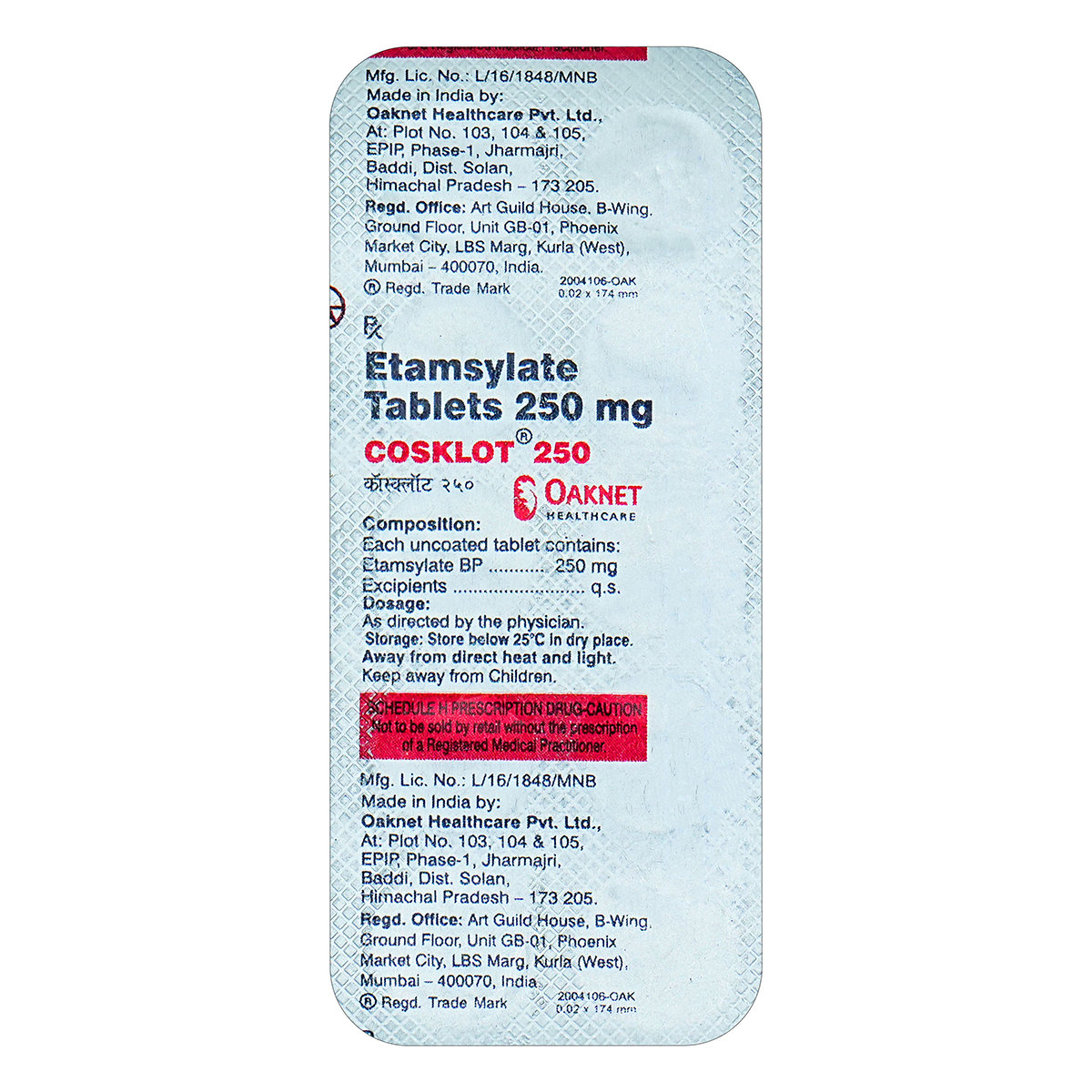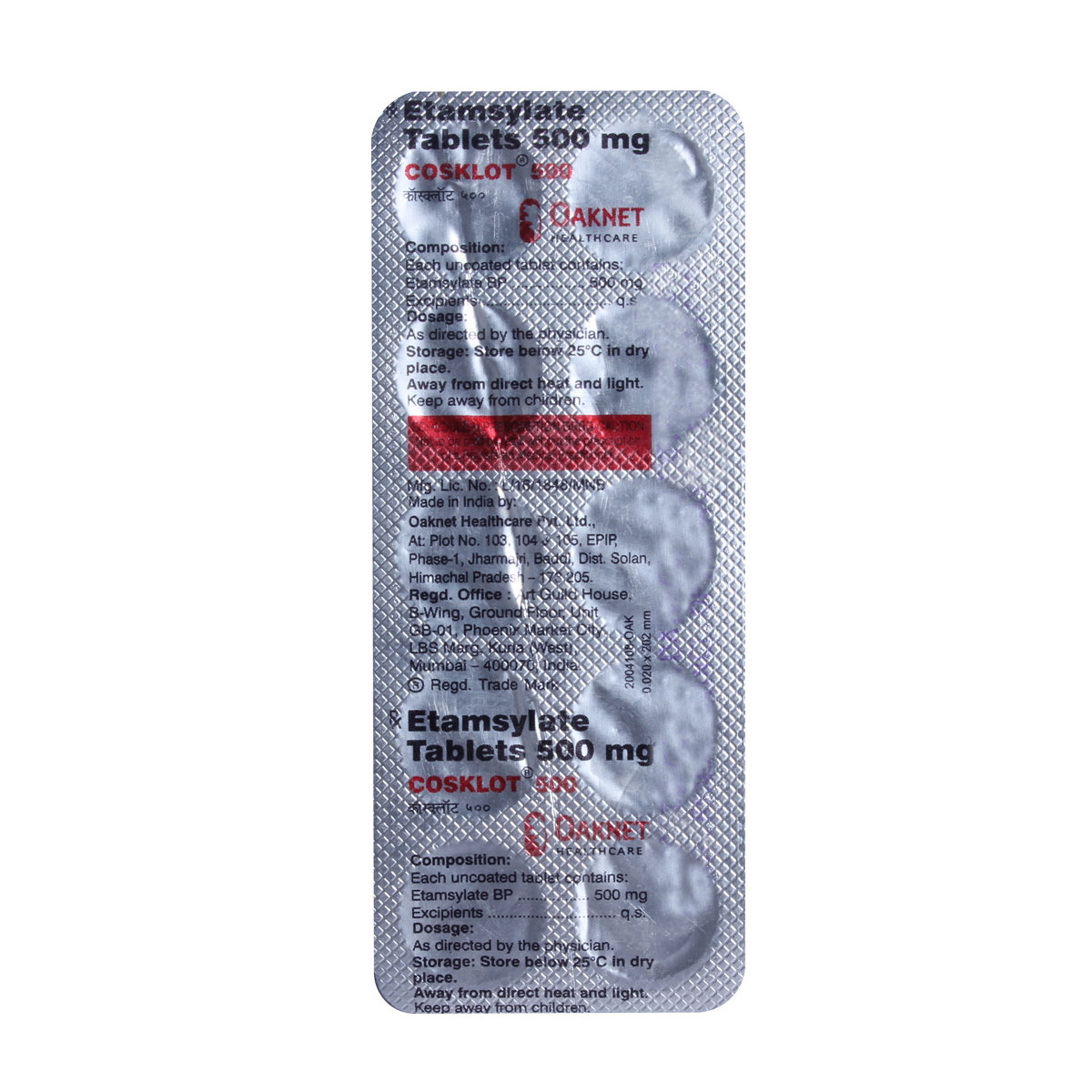Etamsylate
About Etamsylate
Etamsylate belongs to the class of antihemorrhagic drugs. It is indicated in the treatment of small vessel haemorrhage menorrhagia (menstrual bleeding that lasts more than 7 days) including IUD users and prophylaxis of periventricular haemorrhage in neonates. It prevents and controls bleeding from small blood vessels and neonatal intraventricular haemorrhage. Besides this, Etamsylate can prevent periventricular haemorrhages in prematurely born children.
Etamsylate contains Etamsylate, a hemostatic agent that improves platelet adhesion by restoring capillary resistance and improving platelet adhesion. On the other hand, this medicine also inhibits the biosynthesis and action of prostaglandin. These effects help to decrease abnormal bleeding.
Etamsylate should be used as prescribed by the physician. Etamsylate may cause side effects such as headache, skin rash, nausea and low blood pressure. These side effects are short and may go away with time; however, if they continue, consult a doctor.
Inform your doctor if you are allergic to any medications and foods, if you have acute porphyria, fever, non-cancerous growths or blood pigment disorder, or if you are pregnant or breastfeeding. Etamsylate is not recommended to use before the onset of bleeding during periods, so inform your doctor about your condition. And also, notify your doctor about your current list of medications, pre-existing diseases, and current health conditions (e.g. pregnancy, upcoming surgery, etc.) in order to rule out any potential negative effects.
Uses of Etamsylate
Medicinal Benefits
Etamsylate contains Etamsylate, a hemostatic agent that improves platelet adhesion by restoring capillary resistance and improving platelet adhesion. On the other hand, Etamsylate also inhibits the biosynthesis and action of the prostaglandin. These effects help to decrease abnormal bleeding. Thus it treats, controls, and improves various disease conditions and symptoms.
Directions for Use
- Take Etamsylate with or without food as advised by your doctor.
- Follow your doctor's instructions on the dosage and timing of this medication to ensure safe and effective use.
- Swallow Etamsylate as a whole with a glass of water.
- Do not crush, break, or chew it.
Storage
Side Effects of Etamsylate
- Headache
- Skin Rash
- Nausea
- Low Blood Pressure
Drug Warnings
Before prescribing the Etamsylate, let your doctor know if you are allergic to any medications and foods if you have acute porphyria, bronchial asthma, fever, non-cancerous growths or blood pigment disorder, or if you are pregnant or breastfeeding a baby. Etamsylate is recommended not to use before the onset of bleeding during periods, so inform your doctor about your condition. And also, inform your doctor about your current list of medications (including vitamins and supplements), pre-existing diseases, and current health conditions (e.g. pregnancy, upcoming surgery, etc.) in order to rule out any potential negative effects.
Drug Interactions
Drug-Drug interactions: No interactions found or established.
Drug-Food interactions: No interactions found or established.
Drug-Disease interactions: Etamsylate may interact with disease conditions, including bronchial asthma, acute porphyria, fever, non-cancerous growths or blood pigment disorder. So, inform your doctor about your medical condition.
Drug-Drug Interactions Checker List:
Safety Advice

Alcohol
cautionThe interaction of alcohol with Etamsylate is unknown. Please consult a doctor if you have any concerns.

Pregnancy
safe if prescribedInform your doctor if you are pregnant or suspect pregnancy. Your doctor will weigh the benefits and potential risks before prescribing Etamsylate.

Breast Feeding
safe if prescribedInform your doctor if you are a nursing mother. Your doctor will weigh the benefits and potential risks before prescribing Etamsylate.

Driving
safe if prescribedEtamsylate has no or negligible influence on the ability to drive and operate machines.

Liver
cautionIf you have or history or evidence of liver disease, please inform the doctor before prescribing Etamsylate. Your doctor may adjust the dose based on your condition.

Kidney
cautionIf you have or history or evidence of kidney disease, please inform the doctor before prescribing Etamsylate. Your doctor may adjust the dose based on your condition.

Children
safe if prescribedEtamsylate should be used in children and neonates under the supervision of a doctor.
Habit Forming
Diet & Lifestyle Advise
- Maintain a healthy weight. Stay physically active.
- Consume fresh fruits and vegetables. Avoid spicy, salty, and deep-fried foods. Eating healthy can help you to recover faster.
- Avoid tea, coffee, and cold drinks.
- Drink plenty of fluids to stay hydrated. Fluids are necessary to maintain blood flow in your body.
- Avoid the intake of alcoholic beverages as it can make you dehydrated and also can affect your sleep.
- Avoid physical and psychological stress.
Patients Concern
Disease/Condition Glossary
Bleeding disorders: Bleeding disorders are a group of diseases that occur when the blood fails to clot properly. Platelets, a type of blood cell, stick together and form a plug at the site of an injured blood vessel during normal clotting. Clotting factors, which are proteins in the blood, then interact to form a fibrin clot, which is essentially a gel plug that holds platelets in place and allows healing to occur at the site of the injury while preventing blood from escaping the blood vessel. While excessive clotting can result in conditions such as heart attacks and strokes, the inability to form clots can be equally dangerous, resulting in excessive bleeding. Bleeding can occur as a result of insufficient or abnormal platelets, insufficient or abnormal clotting proteins, or abnormal blood vessels.
Haemorrhage menorrhagia: Menstrual periods with very excessive or protracted bleeding are known medically as menorrhagia. Despite the fact that most women worry about their periods being heavy, menorrhagia is not a regular occurrence in most women.
Neonatal intraventricular haemorrhage: A newborn’s intraventricular haemorrhage (IVH) is bleeding into the fluid-filled regions, or ventricles, that surround the brain. The condition is more common in preterm babies, and the smaller and more premature the infant, the greater the risk for IVH. This is due to the fact that blood vessels in premature infants' brains have not yet fully matured and are extremely fragile. IVH is rarely present at birth, and if it does occur, it is usually in the first few days of life.
Periventricular-intraventricular haemorrhage is a disorder that primarily affects premature newborn infants born before 33 weeks of gestation. Haemorrhage develops when arteries in the periventricular portion of the germinal matrix break and expand into the intraventricular space. Periventricular haemorrhage occurs when bleeding extends into the intraparenchymal area next to the ventricle.
FAQs
Etamsylate is indicated in the treatment of small vessel haemorrhage menorrhagia (menstrual bleeding that lasts more than 7 days) including IUD users and prophylaxis of periventricular haemorrhage in neonates. It prevents and controls bleeding from small blood vessels and neonatal intraventricular haemorrhage. Besides this, Etamsylate can prevent periventricular haemorrhages in prematurely born children.
Etamsylate, a hemostatic substance found in Etamsylate, works by restoring capillary resistance and enhancing platelet adhesion. On the other hand, Etamsylate also inhibits the biosynthesis and action of the prostaglandin. These effects help to decrease abnormal bleeding.
Yes, Etamsylate is contraindicated in people with known allergies to any of the components of this medicine. It should be avoided in people with porphyria (a group of rare inherited blood disorders).
In case you have missed a dose, skip the missed dose. Then resume your next dose as normal. Do not take a double dose in any case.
No, you are not recommended to stop using Etamsylate without consulting your doctor, as it may cause recurring bleeding. Therefore, take Etamsylate for as long as your doctor has prescribed it, and if you are experiencing any difficulty while taking Etamsylate, please consult your doctor.
Majority of cases, Etamsylate is prescribed by your doctor for prevention and control of bleeding from small blood vessels haemorrhage menorrhagia and neonatal intraventricular haemorrhage. Besides this, it can also be used to prevent periventricular haemorrhages in prematurely born children.
Etamsylate may cause side effects such as headache, skin rash, nausea and low blood pressure. These side effects are short and may go away with time; however, if they continue, consult a doctor.
Etamsylate is used to treat menorrhagia (menstrual bleeding that lasts more than 7 days). It is not recommended for use before the onset of bleeding during periods; therefore, it should not be used to avoid getting menses.
Let the doctor know if you have any other medical conditions or if you are taking any other medicines. Consult the doctor if you are pregnant or breastfeeding.






